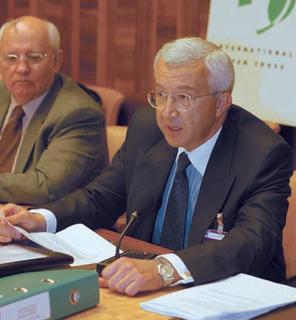“Boston Legal” TV: God and Evolution


As Steven Johnson
Kelley could not have picked a more timely topic. Indeed, the vast attention now focusing on this controversy exemplifies modern journalists’ herd mentality — the “bandwagon effect,” as it used to be called. Yet in this case, one can hardly object. The public’s current fascination with the issue is actually a sign of growing sophistication, for this philosophical debate deserves wide discussion.
Surprisingly, the Boston Legal writers argued against the opinion that most intellectuals and scientists share. The script showed a brilliant lawyer (played by Candice Bergen) arguing that “Intelligent Design” should not be excluded from the curriculum; indeed, she persuaded the judge. Whereas I agree with that verdict, I’d have framed the issue differently. I loved the show, but it might have gone deeper.
The case was depicted as a Scopes-trial-in-reverse. Here the dispute was about banning, not evolutionism, but an opposing doctrine, “Intelligent Design,” which was portrayed as a moderate form of creationism. Its proponents did not deny evolution, but only theorized that something else may also be operating besides evolution — namely, God. Such a notion does not seem outlandish to me, but in the show, the science teacher dismisses it as an anti-scientific proposition, unworthy of mention in a classroom. Nevertheless, the judge decides against banning Intelligent Design theory for the same reason that he would have refused to ban evolutionism: that every issue is discussable. So far as it goes, that verdict seems right to me.
I mentioned the show to an academic friend — an evolutionist — who, along with most other scientists, regards Intelligent Design theory as a reactionary, irrational attack on evolutionism. Darwinism, she says, has passed every empirical challenge with flying colors and it is impossible to discuss Intelligent Design as if it were intellectually equivalent. It’s a theological, not a scientific doctrine, and therefore does not belong in the classroom. My friend herself, like the majority of other scientists, believes in God, but she keeps her theology entirely separate from her evolutionism, which is based on empirical findings.
I think it’s a mistake to suppose that science and religion have nothing to say to each other. Both projects are attempts to explain how the universe works. Officially, the majority of scientists and traditional Christians do treat Darwinism and faith in God as incompatible notions, but that does not make religious concerns unimportant — even to scientists. The apparent clash between evolution and religion can be addressed as a serious intellectual problem. Certainly most scientists reflect about it in private, though officially they treat science as a secular discourse appropriate for public discussions from which theology is excluded.
To be sure, a science teacher shouldn’t promote a particular theological solution to the contradiction, but she can mention a range of theories that others have taken when addressing it as a valid question fraught with existential urgency.
To exclude religious concerns from public discussion, as liberals often do, is counterproductive. People whose theological views are simplistic may cling to them all the more fiercely if their concerns are dismissed. Some political observers — notably Rabbi Michael Lerner — (see http://www.tikkun.org/)
Science teachers can properly point out that what evolutionism seems mainly to contradict is the concept of God as a being who created the universe and set it running according to certain causal laws, while nevertheless intruding sporadically to produce particular outcomes.
Instead, religious scientists typically conceive of the supreme being as an intelligence, sort of a “field” that pervades the entire universe, creating its effects constantly — not in opposition to, but rather through, such scientifically ascertainable processes as natural selection and the laws of physics. Science teachers might do their students a real favor by assigning them to read some of Einstein’s spiritual reflections as homework.
Begin with these two quotations: “Science without religion is lame. Religion without science is blind.” And, “I want to know God's thoughts; the rest are details.”













